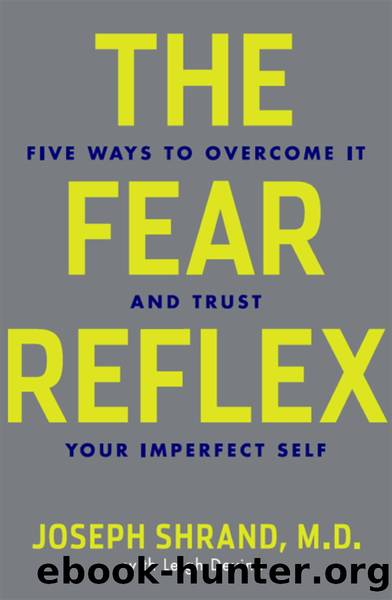The Fear Reflex by Joseph Shrand

Author:Joseph Shrand [Shrand, Joseph; Devine, Leigh]
Language: eng
Format: epub
Publisher: Hazelden Publishing
Fabian: An Unhappy I-M
Fabian, one of my patients and a senior in high school, had performed poorly academically in the eleventh grade. His self-image as a scholar was profoundly damaged, and he feared he would not get into a good college. Not getting into college would place him at a disadvantage in getting a good job, which would place him at a disadvantage at having the family and security he hoped for as an adult. It also meant he would not be able to easily leave home.
His parents were all over him, restricting his cell phone and car privileges, demanding he get his college essays done, and watching him like a hawk for any deviation from their plan to get him through senior year on the honor roll. But the more they pressed him, the more inadequate he felt, the more fear he experienced, and the less productive he became. The less productive he became, the more his parents stepped up their control, which lead to a spiral of defeat where no one felt particularly happy. Small changes can have big effects, and it is through these small ways parents may unwittingly undermine their childâs sense of value by generating fear in their kids. Through the eyes of his parents, this boy began to see himself as a failureâa person who let down not just others but himself as well. In their efforts to help, these parents had unwittingly rendered their son to feel as inadequate as he did. And as his fear increased, he became angrier with his parents, escalating the difficulty in applying for colleges.
The answer for Fabian and many other students in a similar predicament is to use the I-M Approach and recognize that, for whatever reason, the best he could do was screw up eleventh grade. As he began to explore the four domains, he acknowledged he had taken on many more honors classes than he could really manage. But afraid to disappoint his parents, as he realized himself, he did not ask for help but tried to muscle through his difficulty. As he got deeper in academic trouble, his anxiety increased and it became even more difficult to concentrate. So he started to get high on marijuana, which certainly did not help his academics. As his grades continued to plummet, his parents became more anxious.
Letâs look at how Fabianâs story illustrates how the domains of his I-M interact. At home his parents had expectations that he wanted to meet. His Ic domain wanted them to see him as successful and amazing. As such he took on an intense academic load in his social domain, wanting his teachers to also see him as successful and amazing. But under the stress of the academic workload, his cortisol level likely elevated, leading him to feel increasingly anxious and fearful. With all that cortisol, there was no way he could concentrate on math when the limbic system of his biological domain was convincing his PFC that he was in danger of being eaten by a saber-toothed tiger.
Download
This site does not store any files on its server. We only index and link to content provided by other sites. Please contact the content providers to delete copyright contents if any and email us, we'll remove relevant links or contents immediately.
Rewire Your Anxious Brain by Catherine M. Pittman(18656)
The Code Book by Simon Singh(3189)
The Wrong McElroy by KL Hughes(2488)
How to Be Yourself by Ellen Hendriksen(2424)
No Worries by Sarah Edelman(2252)
Anxious for Nothing by Max Lucado(1976)
Life After Darkness by Michelle Knight(1970)
The Velvet Rage by Alan Downs(1885)
I Really Didn't Think This Through by Beth Evans(1795)
Unfuck Your Brain: Using Science to Get Over Anxiety, Depression, Anger, Freak-Outs, and Triggers by Faith G Harper(1763)
The Anxiety Workbook by Arlin Cuncic MA(1697)
First, We Make the Beast Beautiful by Sarah Wilson(1666)
Free Yourself from Fears by Joseph O'Connor(1649)
How Not to Worry by Paul McGee(1620)
You Can Do All Things by Kate Allan(1602)
The Worry Trick by David A Carbonell(1521)
Coping with Anxiety by Edmund Bourne & Lorna Garano(1508)
Need by Unknown(1471)
The Sensory Child Gets Organized by Carolyn Dalgliesh(1448)
